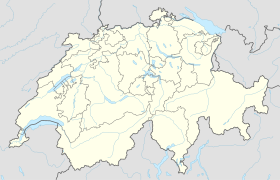Sool GL
| GL is the abbreviation for the canton of Glarus in Switzerland and is used to avoid confusion with other entries of the name Sool . |
| Sool | ||
|---|---|---|
| State : |
|
|
| Canton : |
|
|
| District : | No district division | |
| Political community : | Glarus South | |
| Postal code : | 8762 | |
| former BFS no. : | 1629 | |
| Coordinates : | 725.31 thousand / 206 908 | |
| Height : | 637 m above sea level M. | |
| Area : | 13.26 km² | |
| Residents: | 296 (December 31, 2010) | |
| Population density : | 22 inhabitants per km² | |
| map | ||
|
|
||
Sool is a former political municipality in the canton of Glarus in Switzerland .
The village was under the Glarner municipal reform on 1 January 2011, with the municipalities Betschwanden , Braunwald , Elm , Engi , Haslen , Linthal , Luchsingen , Matt , Mitlödi , Rüti (GL) , Schwanden (GL) and Schwändi the new municipality Glarus South merged.
coat of arms
- On a red background a white castle with a golden rising sun over the gate.
The coat of arms was first documented around 1700.
geography

Obersool, Untersool and the hamlet of Warth belong to the community. In prehistoric times, a rock fall from the Guppen blocked the whole valley with its debris until the Linth made its way through the dams again. The community lies above Linth and Sernf on highly water-permeable subsoil. The neighboring communities of Sool are Mitlödi , Ennenda , Engi , Schwanden , Mühlehorn and the canton of St. Gallen . 1.2% of the community area is settled, 23.6% are used for agriculture, 42% are forested and 33.2% are unproductive.
population
| Population development | |
|---|---|
| year | Residents |
| 1850 | 550 |
| 1950 | 429 |
| 1990 | 259 |
| 2005 | 298 |
politics
The Social Democratic Party of Switzerland (SP) has 80.3% of the votes, 19.7% of the votes go to other parties.
economy
No industry or trade has established itself in Sool, which is why 80% of the workforce are commuters.
history
The community name comes from the Old High German sol (= wallow, pond). Such pools existed in abundance in the Untersool until they were drained in the 19th and 20th centuries. In Habsburg Urbar Sool was first documented to the 1300th
In the Middle Ages, the trade route into the Sernftal valley led through Sool. After Glarus the place was a church, from 1349 to Schwanden. The residents joined the Reformation in 1528 . Obersool the village center was rebuilt after the village fire in 1713.
A first school building was opened in 1832. Since 1848 the community has been directing water from external sources into the village, first in wooden pipes, and from 1875 in cement and iron pipes. The water supply improved in 1955 when the springs were captured in the Gheist and fed into the Weid reservoir .
Attractions
Lochsyte
The Lochsyte in Schwanden above the Sernftalstrasse is one of the most famous geological sites in Switzerland. The Alpine thrust is particularly clearly visible here.
The Glarus thrust was scientifically investigated in the Lochsyte. The plate tectonics resulted in some 30 million years ago in the Glarus Alps to a fold in the older rock layers ( Permian Verrucano ) over the younger ( Eocene shale ) came to be. Since Arnold Escher von der Linth found the explanation for the formation of the Alps here on August 1, 1840, the Lochsyte still attracts the interest of geologists today. It is freely accessible. There are guided tours for groups.
A lifelike replica of the Lochsyte is on display in the Natural History Museum of New York .
photos
Web links
- Karin Marti-Weissenbach: Sool GL. In: Historical Lexicon of Switzerland .
Individual evidence
- ↑ Ferienregion Elm ( page no longer available , search in web archives ) Info: The link was automatically marked as defective. Please check the link according to the instructions and then remove this notice.






